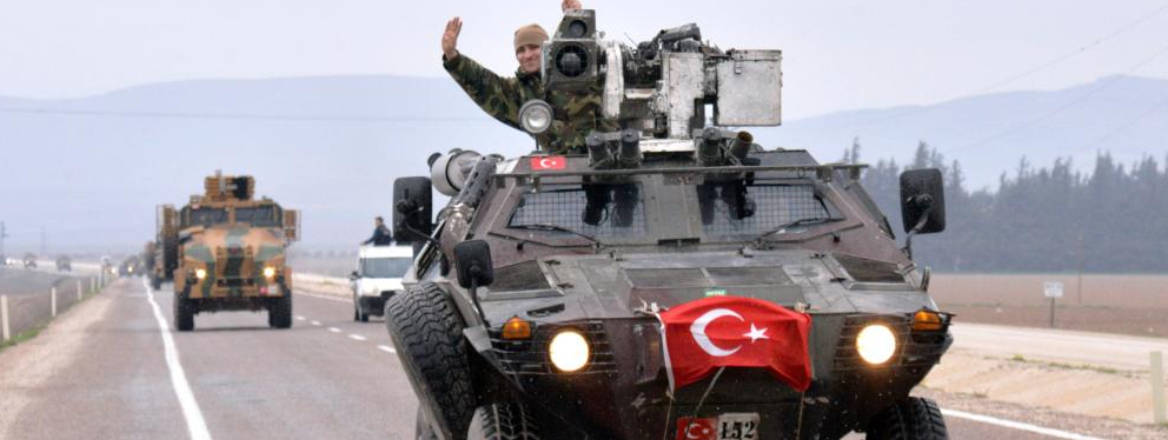Syria: It’s Not Getting any Easier, It’s Getting Messier
Rather than winding down to a peaceable solution, Syria’s war is becoming more violent than ever. And it's down to outside powers supporting local actors
After nearly a month of fighting in the Kurdish enclave of Afrin between local Kurds and Turkish troops, forces loyal to Bashar Al-Assad have rolled in to protect Syrian sovereignty. This quid pro quo deal with the Kurds threatens Ankara’s plans for removing the Kurdish People’s Protection Units (YPG) and its associated political structures from Afrin.
To compound the issue, Assad’s key backer Russia appears to have also turned the tables on Ankara. After having initially acquiesced to Turkish operations in January, Foreign Minister Sergei Lavrov now insists that any solution for Afrin must be based ‘solely on respect for the sovereignty and territorial integrity of the Syrian Arab Republic … all external players, especially those who have a presence in Syria, realize the need to start a dialogue with the Syrian government’.
This poses a genuine headache for Turkish President Recep Tayyip Erdogan. Boxed in from expanding the Euphrates shield operations into Afrin by the Russian-backed Assad regime, or east into Manbij by the US, Turkey will find it extremely difficult to carve out much of a buffer zone or create political conditions in Syria that disempower the Kurds.
It appears that Syrian forces will serve as a border force, forming a buffer between the Kurds and Turkey, while leaving civil control of Afrin to the Kurdish administration
Oddly enough, the one actor that might offer Erdogan a way out is Assad himself. If it happens that the Syrian regime demands that the Kurds hand over political control over Afrin as the price for ensuring their survival, then Erdogan can claim that his decision to take military action removed the Kurdish political threat from southwestern Turkey.
At the time of writing, it appears that Syrian forces will serve as a border force, forming a buffer between the Kurds and Turkey, while leaving civil control of Afrin to the Kurdish administration. Hardly an ideal solution for Ankara, but in this instance Turkey would be inclined to hold on to the small pockets of territory it has so far captured from the Kurds as a symbol of success, and a bargaining chip for negotiation later down the line.
The truth is that Turkey has no real preferred end-state for Syria, in contrast to Russia and Iran, which can at least agree on the fact they want Assad to win. Ankara’s entry into the so-called ‘Astana Process’ has meant that its goals of supporting the rebels against Assad were quickly subordinated by the other two players, who recognised that the key problem for Turkey lay with the empowerment of the Kurds, and not in stopping the Syrian dictator.
For Washington and Ankara creating leverage has meant carving out regions of Syria with a light military footprint and reliable partners on the ground
This places Ankara in the same basket as the US, which also subordinated its goals of removing Assad to those of countering Daesh (also known as the Islamic State of Iraq and Syria, ISIS). And so, absent of any real strategy to solve the conflict, the game switched to creating as much leverage as possible in anticipation of an end-state in Syria.
For Washington and Ankara creating leverage has meant carving out regions of Syria with a light military footprint and reliable partners on the ground, which both have done with relative success. The problem was not so much the tactic, (both the US and Turkey will now be guaranteed a seat at the table when Syria’s war ends), but the choice of partners.
To use the adage, America’s freedom fighters (the YPG-led Syrian Democratic Forces [SDF]) are Ankara’s terrorists, and Ankara’s freedom fighters (a loose alliance of Islamist militias) are very close to being America’s terrorists.
Turkey’s Afrin assault – ironically dubbed Operation Olive Branch – is the product of Ankara’s building frustration at US policy
There is no way to square the circle, Washington and Ankara engaged in two years of tactical manoeuvres in Syria, with the US especially attempting to ignore the building tension. But there is no more space left to kick the can down the road.
Turkey’s Afrin assault – ironically dubbed Operation Olive Branch – is the product of Ankara’s building frustration at US policy, and vice versa. Erdogan’s bombastic rhetoric and stirring of anti-Americanism may feel good and get him cheers in Parliament but it doesn’t produce much in the way of strategic outcomes.
For now, the problem is (and has been for some time) that Ankara’s Syrian policy is constrained by Moscow and Washington. The conquest of Afrin hardly negates that problem.
For their part, the Syrian Kurds remain in a precarious position, but they seem to have played their limited set of cards well. The issue will be whether they can trust the regime to look out for their best interests in Afrin, and whether this border security arrangement will eventually extend to other areas of Kurdish Syria.
Tensions between the SDF and the regime ignited recently around Deir ez-Zor in January as both sides raced to grab territory from Daesh, and there is little doubt that both sides view each other with mutual suspicion.
By openly allying with Assad, the Kurds risk undermining the protection afforded them by the US and make themselves unpalatable to many actors in the Arab world
These tensions have for the moment been tempered by the Kurds’ need for regime support in Afrin, and the fact that Assad has shifted his forces away from the southeast to pursue a brutal suppression strategy in the ‘de-escalation zones’ of Idlib and Ghouta.
When Idlib and Ghouta are eventually retaken by the regime, the relationship between the Kurds and the government will become central to the future of Syria. There is little doubt the Kurds will have to cut a deal with the regime if they are to survive Turkish wrath in the long run, but the Kurd-run Qamishli will want to maintain as much autonomy as possible.
However, by openly allying with Assad, the Kurds risk undermining the protection afforded them by the US and make themselves unpalatable to many actors in the Arab world. But the course seems set and should the Afrin deal hold, it is likely that Assad will eventually reassert control over most of Syria’s northern borders, and eventually the Kurdish controlled border crossing with the Kurdistan Regional Government in Semalka, something the US would be very keen to prevent.
Should this happen, both Syria and neighbouring Iraq will retain control of their borders at the expense of the Kurds, and the one-Syria, one-Iraq policy of the US will be preserved. But it comes at a cost, Ankara will not be pleased with the outcome, and Iran’s hand is strengthened as the two capitals in which it has forged significant influence reassert their control.
Syria’s conflict appears to be producing new political outcomes faster than the West can confront them.
The views expressed in this Commentary are the author's, and do not necessarily reflect those of RUSI or any other institution.
WRITTEN BY
Michael Stephens
RUSI Senior Associate Fellow, RUSI International


